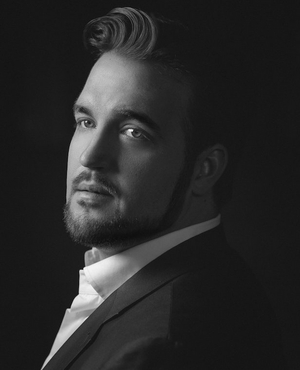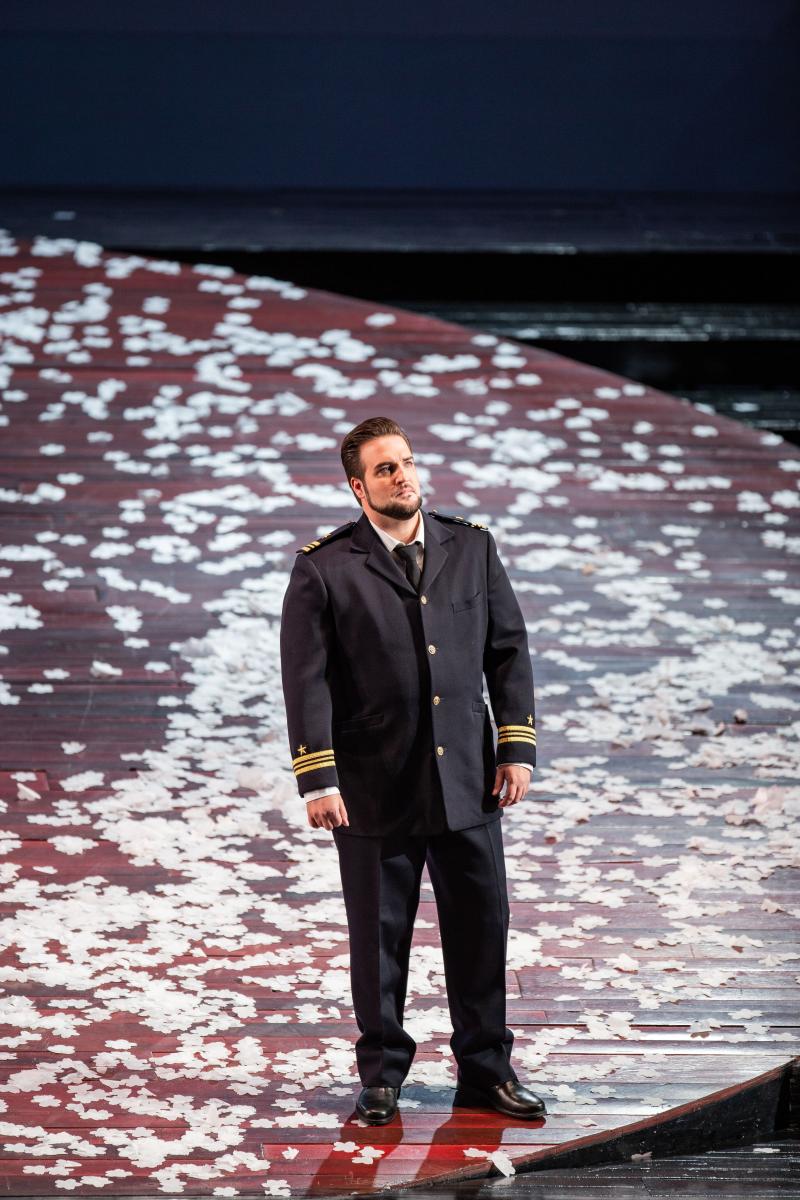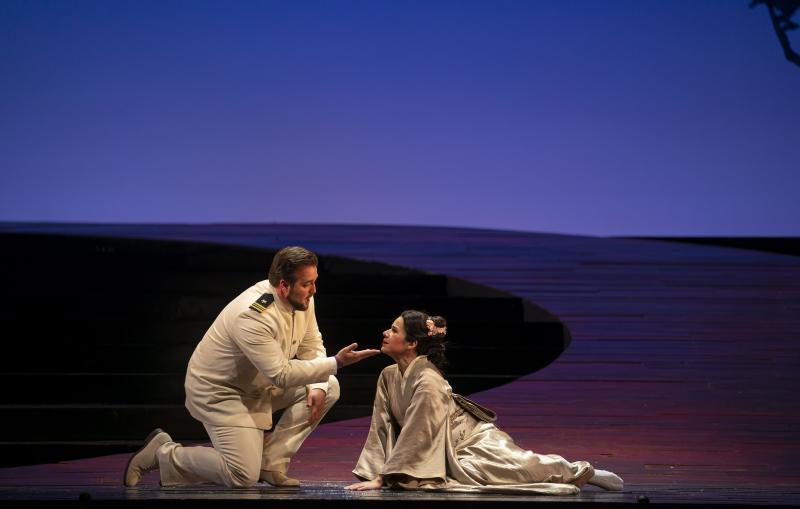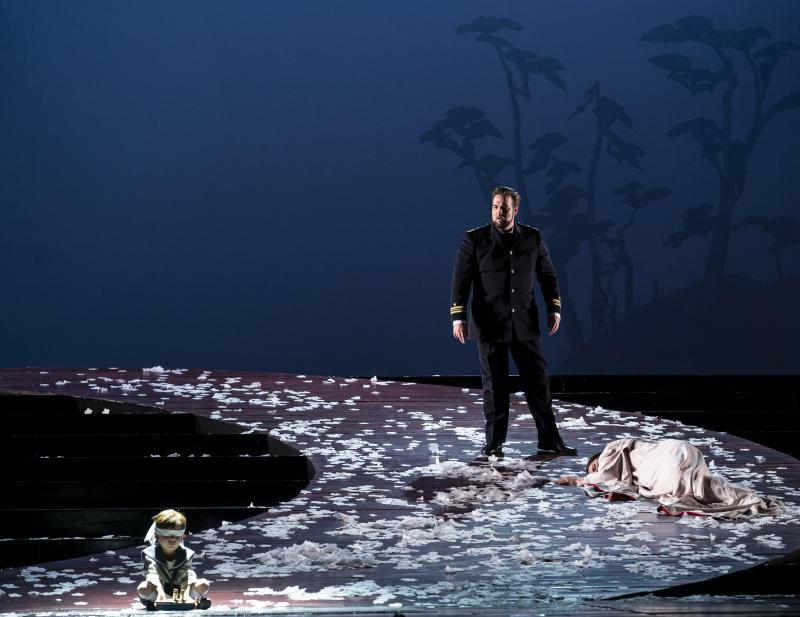Interview: Brian Jagde of MADAME BUTTERFLY at Lyric Opera of Chicago

The first thing to know about Brian Jagde is that his name is pronounced "Jade," like the jewel. He is definitely sparkling, in personality and in talent. Though the prizewinning tenor's earlier education included computer science and business, Jagde seemed destined to be an opera singer. With a Cavalier King Charles Spaniel mix named Cavaradossi as a traveling companion, what could he possibly be but a tenor?
After switching from baritone in 2008, Jagde has made numerous debuts as a tenor--5 of those in quick succession in 2019--and is returning to one of his most frequented venues, Chicago Lyric Opera, this month in one of his favorite roles, Pinkerton, in Puccini's Madama Butterfly. Not limited to the opera stage, Jagde will soon make his debut in Beethoven's 9th Symphony and Mahler's Das Lied von der Erde. I caught up with Brian between Butterfly rehearsals in Chicago.
Erica Miner: What was your journey from Purchase College Conservatory of Music to the opera world?
Brian Jagde: I was born in Plainview, Long Island. I'm a New York guy. I went to State University for computer science and business and wasn't enjoying it very much. I'd always sung, and I'd heard of one school that was starting a new program. I didn't even know it was opera, I just wanted to learn how to sing. I auditioned and got in somehow, so I started all over as a freshman. I'd always sung tenor in chorus and in high school musical theatre. So I went as a tenor. They switched me to baritone about a semester in. I had just started studying opera, not knowing it was something I would fall in love with [Laughs]. It was kind of shocking to them, I guess because the color being created by me, within the technique I was being taught for the first time in my life, had a darker, rounder sound; so they made me a baritone. That stayed with me for the next 8 years. I had done some young artist programs while in my Master's program at Purchase and continued to do young artists programs afterwards, mostly just tiny roles that were really high [Laughs]. I went to Chautauqua and Virginia Opera that way. My first gig in college was Opera Iowa, part of the Des Moines Metro Opera Program. My job was to audition, that's all I did. I had to make my own spreadsheet to find them, everything in a 400-mile radius that I could drive to [Laughs], whether a leading role in a really small company or a young artist program. Meanwhile at these auditions, people were like, "Are you sure you're not a tenor?" I always said, "Well, my teacher says I'm a baritone."
EM: But not necessarily.
BJ: It turns out that's not always the case, but I didn't know any better. After a residency in the Virginia Opera program, my voice kept getting higher. I was able to sing up to a high "C." And I still had no low notes to speak of [Laughs]. No natural bottom. I thought I should look into this. I found a teacher in New York--I was living in the City on and off, mostly waiting tables to pay rent and study voice. (My mom's a chef, so I'd been in the food industry since I was a kid.) The only three things I did were sleep, study voice and work in restaurants. Anyway, I walked into him (the teacher) and he said, "You're a tenor." [Laughs.]

EM: Without even hearing you.
BJ: He's very familiar with singers' anatomy. He did a residency to study all the body parts of the voice and bodies of singers. He just heard my speaking voice and could see from the shape of my neck, "I doubt in any way that you're a baritone." [Laughs.] We worked a bit and I understood what he was trying to do. It was stuff that I never heard before about technique. After a week of lessons he said, "I'll work with you as a baritone, but I don't think it would serve either of us." 2 weeks later I was doing my first audition for a manager, got one and sang tenor arias for all the auditions I had set up as a baritone. 5 weeks later I auditioned for Merola and got into the young artist's program, my first year as a tenor. It was all a little scary [Laughs].
EM: What was that experience like?
BJ: I was shocked at all the transition happening so fast. It's only considered the best summer young artist's program in the country. But it all worked out. I kept studying and waiting tables. The next thing I know, they offered me an Adler-ship. I was shocked. It's always somewhere I would have wanted to go, whether as a baritone or a tenor. As an Adler I got tons of stage experience on one of the largest stages in the world, physically and on the spectrum of how big opera can get. My experience with coaches was helpful, too, especially since I was still learning all this repertoire, having just switched to tenor. It was all really new, super exciting. I was gung-ho. It's the only way you can be, you have no choice, as to "making it." [Laughs.]
EM: Where was your first big debut?
BJ: I had some tenor roles in some regional houses. In my third year as an Adler they offered me Cavaradossi in Tosca. That was a pretty big deal. Previously I'd found a really great cover job in Santa Fe, Cavaradossi. Then my big break came. I'd just come off winning Operalia that summer and at Santa Fe the tenor who was supposed to sing the role was released from his contract. They asked if I would sing the role a week and a half before opening. I was like, "Okay." [Laughs.] It was kind of shocking, but I really went for it. You don't have much choice in these matters. I was just a nobody [Laughs] walking in just trying to cover a role to have it under my belt. Here I am getting 12 performance chances to sing for people who travel to Santa Fe from all over the world, a big deal. That whole season all of a sudden people started to know who I was as opposed to just this guy singing in Upstate New York.
EM: Now you're singing Pinkerton in Chicago.
BJ: for the first time in 2 ½ years. When I made my debut here it was sudden. Again, another tenor was unable to perform, and they needed a Cavaradossi. That seems to be one of the roles that introduces me to houses [Laughs]. That was 5 years ago. Chicago famously casts far into the future, so this is the first gig they could offer me. Here I am, finally back. I'm so happy to be here. It's an incredible house. I love singing here. And with Ana Maria (Martinez), who is just one of the gems of our business. She has this spirit around her, so pleasant and humble. Just a lovely person to work with. It makes me want to be a better singer, even more than I always do. I'm pretty hard on myself [Laughs] and it's nice to work with people like her.

EM: You seem to be doing a lot of Puccini. What are some of your other favorite roles?
BJ: This year is mostly Puccini, all roles I've done before. Last year was kind of crazy, all brand-new roles. Sometimes we have to take hard, challenging new roles, but it's nice to come back to a role that you feel very comfortable in. Puccini was always a natural love for me. When I was a baritone all I wanted to do was sing the heavier Puccini roles. Unfortunately, because I was "a light baritone" I couldn't sing them [Laughs]. Here I am now, singing a lot of Puccini. My favorite exciting role I'm going to be doing that I got to do last year is Cavalleria. I truly loved doing it. Such a different challenge for me vocally. I did it twice last year, once for recording and once for another video of a new production by Robert Carsen. I did 10 performances of Don Alvaro in Forza. That was my true Verdi debut lead. I had done Traviata, Macduff, smaller roles like Ismaele in Nabucco, Radamès in Aida. But this was another thrust into the heaviest realm of Verdi. All of a sudden my voice felt so comfortable. It was a big challenge, of course. We take all kinds of roles as singers. Some are more serviceable, some are where we thrive. Pavarotti sang everything under the sun, but can anybody claim that Nemorino wasn't the best fit for his voice? It's not only about being the "right" voice that people have in their heads. It's about making it you, within your voice. Forza felt so comfortable. Like when you find the right pillow, you know? It's really important for your neck support throughout the night [Laughs]. I had 2 debuts with Luisotti last year, one was Forza. To have somebody in the pit who worked with me so much, it makes all the difference. We did Lescaut in San Francisco last year. More Puccini, of course [Laughs]. Seems like there's a need for tenors who have that kind of weight in their voice and are able to sing really long nights. I sang 3 roles last year that were over 3 hours long. Lescaut, Forza and Enzo in Gioconda, which is a whole other ball of wax [Laughs].

EM: The tessituras for all of them are difficult.
BJ: They're high and heavy. To thrust yourself in a 3,000-seat house over a full orchestra blaring away in Puccini, you really have to have enough voice, enough cut. It's really a challenge.
EM: You've been interviewed for Wine Spectator Magazine. Does that come from your mom being a chef?
BJ: It's all related. When my mom was learning to become a chef I was already 6 or 7. She watched a lot of TV cooking shows. Not for entertainment, but for the details of how to make a meal. I watched her do that every night. She started making different meals and went to school for it. I always was fascinated, paid attention when she was cooking. I think there's an art to cooking. Maybe that's why I was connected to it. Waiting tables felt so comfortable for me. In one job, wine classes were mandatory. They really wanted us to be at a high New York City level with training, even though this was in Westchester. I think that's where I learned how to love wine. I got to taste all kinds, learned how to serve them, studied all the different varietals of grapes, understood the flavor profiles. I became super fascinated, obsessed. How people produce wine is such an art form. Knowing what flavor profile you're going to go for, how to let the grapes do what they do. There's a lot that goes into it. Viticulture is incredible.
EM: You could study it for a lifetime.
BJ: [Laughs] Exactly. When I moved to New York City in 2006 I was working at a new restaurant, A Voce. They had this master sommelier from France. At the time there were like 200 people in the world with that title. He offered me an assistant sommelier position. I'd gotten to taste amazing wines because the clientele could afford them. Some could pay $6500 a bottle.
EM: [Gasps.]
BJ: There was this cool billionaire who would come in for lunch once a week-he was a fan of the chef. He'd spend $10,000 on wine every week. He'd start with a white burgundy-$2500-and would only have 1 or 2 glasses. If he wanted meat, he would have a red. He then would move to the red Bordeaux--$6,000 or $7,000 a bottle. We'd never charge him for food [Laughs]. He would leave so much wine behind, never drank all of it. So we servers all got to try so many amazing wines. Latour from the 40s, Petrus from the 80s, wines I could never afford [Laughs]. After such a long time of studying wines I finally got to taste them. In San Francisco there was a gentleman from Wine Spectator who is a big opera fan and liked the idea of a crossover. So I was in the magazine last year. It comes in handy when you're at a dinner table and trying to entertain your friends who appreciate it.
EM: I've been reading about Your work with Opera for Peace (https://operaforpeace.org). Can you describe the organization and your role?

BJ: It's very new. I'm titled "peace ambassador." There's never been an organization like this in the opera world. The first part of their mission, which connects all the young artist programs worldwide, is geared toward the young artist and the future of opera, a way to exchange information. So far we've had many partners sign up to be a part of it, a lot of them major opera houses. This year we're starting an exchange of 1 or 2 students from overseas, have them transfer to a company in the US for 2 or 3 weeks and vice versa. Not only are you getting a culture change but you're also seeing how other people teach around the world. Something I've noticed the more I've worked in Europe is how much knowledge you can have just from being there. Even on a 2-week contract I can learn something new all the time. There's so much knowledge out there and this is going to help spread the wealth of it. As an ambassador I'm going to be involved in concerts that raise money for young artists around the world and also for master classes. We have a great team of ambassadors, 17 or 18 of them, lots of amazing people like Lawrence Brownlee. It's very diverse look at opera, too, to express the themes of diversity, acceptance, peace, love, trying to partner with organizations like the Nobel Prize Committee and UNESCO. There's unlimited potential.
EM: You're slated to perform concert works. Do you foresee more concerts in the future?
BJ: I debuted the Verdi Requiem with Concertgebouw, an awesome experience. Next season I'm doing Beethoven 9 and Das Lied, the kind of rep that suits me. I'm not going to end up singing a ton of Messiahs [Laughs]. I will do other Mahler pieces, like the 8th. There are tons of song cycles with orchestra, too. So I'm looking forward to doing many more concerts. It's super exciting. I really have enjoy being onstage with orchestra. It's kind of cool not having to play a character and just be yourself. I also love doing recitals. This year I'm honored to be asked to do another recital in Peralada, Spain. They have this amazing festival. Jonas Kaufmann, Piotr Beczała and I are going to be performing there around the same time. It's going to be a cool summer for tenors [Laughs].
EM: You'll be in good company.
BJ: It'll be fun. I'll be singing at the Met again, too. It's always nice to sing in all the houses in America. Nice to be home, too [Laughs].
EM: I'm delighted for you, and so happy to talk to you. This has been terrific. Toi, toi, for Butterfly!
BJ: Thank you, Erica.
Chicago Lyric Opera's Madame Butterfly runs from Feb. 6 - Mar. 8 at the Civic Opera House (https://www.lyricopera.org/productions/2019-20/madama-butterfly/).

Photo credits: Simon Pauly, Todd Rosenberg
Comments

Videos

